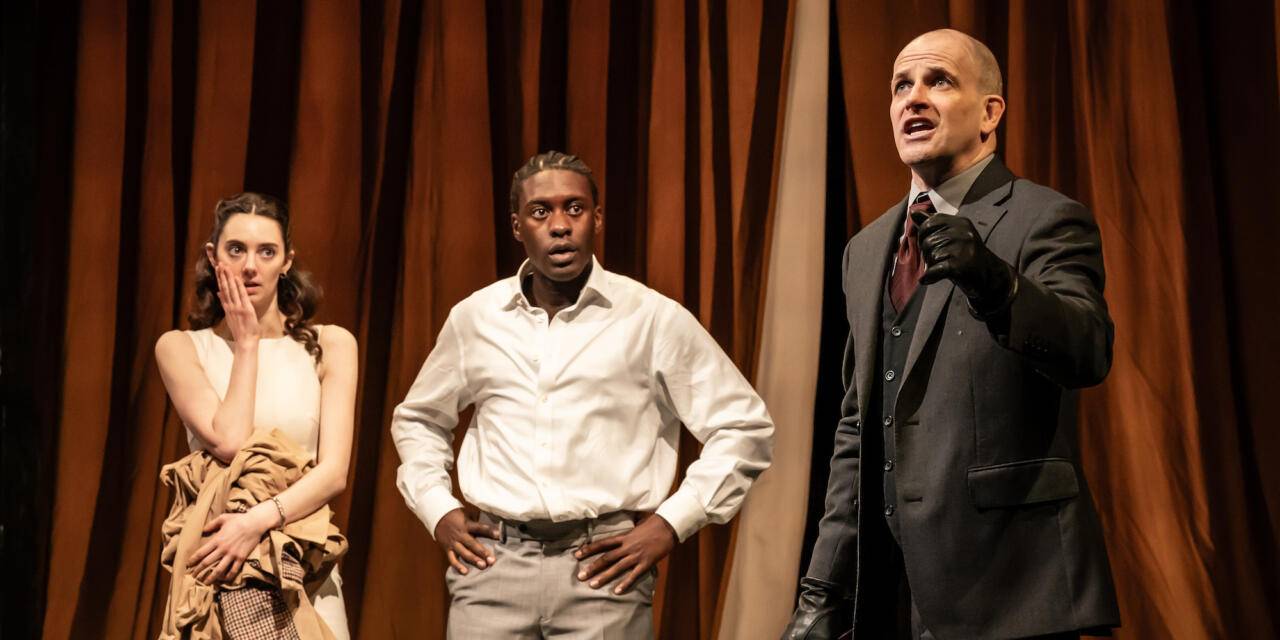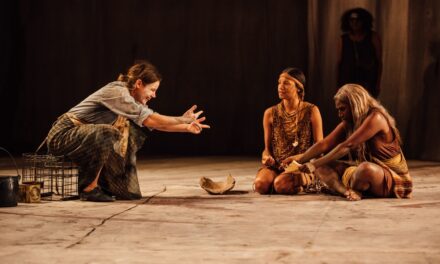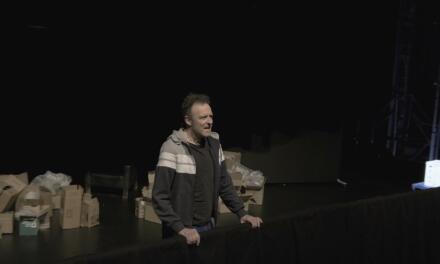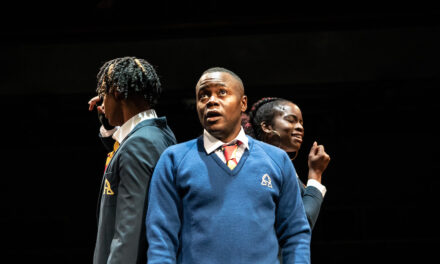“This play is a lie,” boldly declares the poster of Sam Holcroft’s new play A Mirror, now playing at London’s Trafalgar Theatre after its initial run at the Almeida Theatre last summer. It’s a curt statement, at once provocative and revealing, cutting to the heart of this reflexive drama about theatrical censorship and the politics of playwriting.
Set in an unnamed country run by a totalitarian regime, A Mirror is a Russian doll of plays nested into one another: what starts out as an innocuous wedding ceremony—complete with flowers, frills, and vows—is soon self-interrupted and morphs into the underground performance of a play that’s meant to be an exposé of the state’s censorial and propagandist activities. In this piece, Adem (Samuel Adewunmi), a mechanic-turned-playwright, is questioned by censor Čelik (Jonny Lee Miller) about his motivations for writing a realist play about his neighbors, as Čelik’s newly minted aide Mei (Tanya Reynolds) observes the proceedings.
Čelik is both impressed and alarmed by Adem’s raw talent, which he wants to channel into producing works of propaganda. Over a series of meetings, Čelik strives to train the promising writer in the fundamentals of “artful” dramaturgy, steering him away from his habit of replicating on the page—indeed, transcribing—conversations he hears (and overhears) in his daily life, including the ones he has with Čelik and Mei. But Adem’s increasing resistance threatens to spin things out of control.
In the central role, Miller sustains a jumpy, showman-like presence, revealing his fine attunement to Čelik’s pontificating character and duly exaggerating the man’s hypocrisies. As Mei, Reynolds engagingly portrays a credible journey from meek obedience to inquisitive fervor. Geoffrey Streatfield is especially captivating as Bax, a leering, sell-out dramatist whose commitment to writing propaganda plays begins to crumble after he meets Adem.
Max Jones’s spare set emphasizes the playing area’s undercover identity as a wedding venue, gradually resorting to simple furniture for the central scenes, while Azusa Ono’s mellow lighting helps us find our bearings across the play’s different layers. Much of the action is effectively underscored by Miriam Wakeling’s cello, which supports the tonal shifts of scenes—and of plays within plays.
Directed by Jeremy Herrin, Holcroft’s reflective and surprisingly witty drama is unafraid to pose big questions about the political functions of theatre in repressive regimes and the manifold hypocrisies of censorial practices: What are the ethics and politics of realism on stage? How can we reconcile the inherent “lies” of theatrical art with their deployment for and against totalitarian purposes? If the goal of theatre is indeed to hold the mirror up to nature, then whose mirror, and whose nature, are we talking about?
Even as the play’s smart, intricate structure keeps one intrigued, there remain significant lags in momentum across several scenes, diluting the overall effect of its metatheatrical turns. The ending, importantly, offers something of a twist that puts much in perspective, solidifying the focus on artistic dissidence. For all its searching and playful spirit, A Mirror leaves one somewhat underwhelmed by the generality of its critique: the parallels between the events depicted here and various censorial practices across the globe are sadly obvious, but the play’s constrained referentiality ends up conveying a pat distillation of immensely thorny realities. Much sharper shocks, and even more incisive observations, could have come out of this inspired puzzle box.
This post was written by the author in their personal capacity.The opinions expressed in this article are the author’s own and do not reflect the view of The Theatre Times, their staff or collaborators.
This post was written by Mert Dilek.
The views expressed here belong to the author and do not necessarily reflect our views and opinions.


















